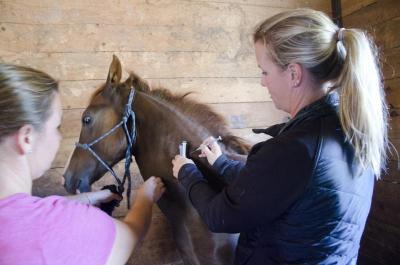Horse's death spurs EEE vaccinations
Following a horse’s death last week in Rochester from Eastern Equine Encephalitis, veterinarian Kendyl Foristall-Drass said she’s been getting a lot of phone calls.
Whether horses can transmit the neurological disease to humans is one question she’d like to set straight.
The answer? No.
But the question of vaccination is one that will always get a yes from Foristall-Drass.
“It’s a scary disease,” said Foristall-Drass of Highland Hill Veterinary Service in Middleboro.
“If you’ve ever seen a horse with EEE die, you would vaccinate. Of all the diseases they can be vaccinated for, it’s probably the most brutal, second maybe to rabies.”
According to the American Association of Equine Practitioners, EEE-infected horses have a mortality rate “approaching 90 percent.”
“It all goes very quickly. Once they show signs, they will usually be dead within two or three days,” said Foristall-Drass while vaccinating the horses of Stone Tree Acres in Marion.
Foristall-Drass said clinical signs of EEE include fever, profound lethargy and seizure.
They also fall down, are unable to stand and can end up almost comatose, she said.
Foristall-Drass said most horses are vaccinated in the spring and get a booster in the fall since peak EEE season is August and September.
“Technically the vaccine is labeled for one year’s use, but for endemic or high risk areas we will do it every six months,” said Foristall-Drass.
Unvaccinated horses should get their first shot, followed by a second one in three to four weeks, she said, however it will take several weeks for the vaccination to take effect.
Foristall-Drass said llamas can also contract the disease, though the effectiveness of the vaccine is not as well studied for them.
While Foristall-Drass respects that some owners want to opt out of vaccines, she hopes they will rethink that decision regarding EEE.
“I would be shocked if there were vaccinated horses who got the disease,” she said.
Following the first hard frost, the threat will go down, but Foristall-Drass said, “Horses are so susceptible. It’s hard to know how long mosquito season is going to last.”















